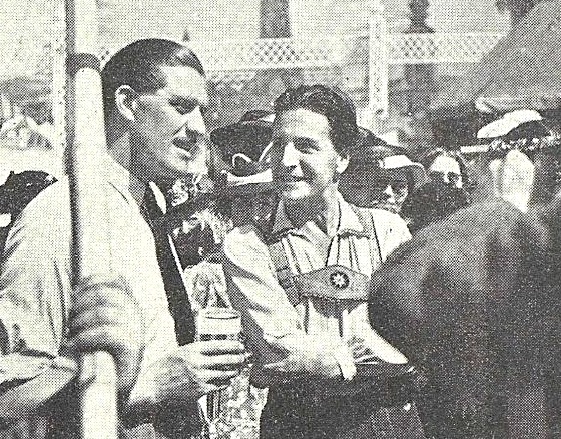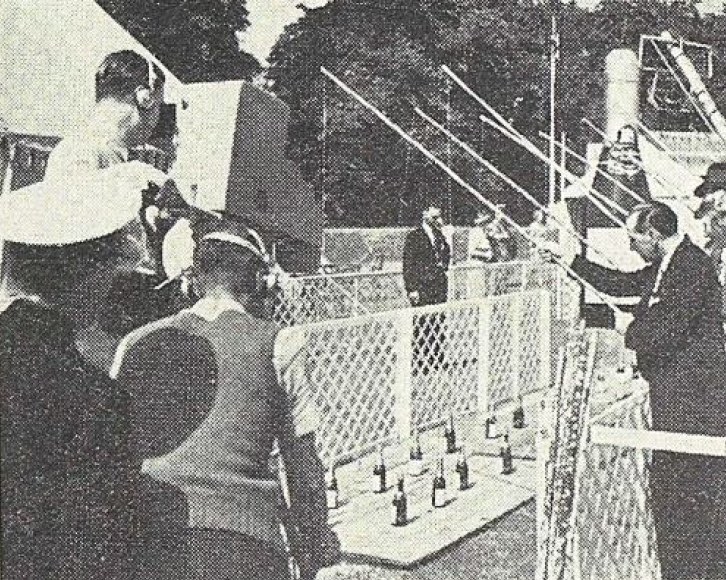OTD in early British television: 6 June 1939

John Wyver writes: For the best part of an hour on the afternoon of Tuesday 6 June 1939 lookers-in were taken off to the gardens of the Ranelagh Club for the annual Theatrical Garden Party. Among those who were observed and encountered were Noel Coward, Ivor Novello (above, with Leslie Mitchell), Diana Wynyard and playwright Clemence Dane.
Also making appearances were Telegraph journalist L. Marsland Gander; Mrs Smithers, recorded as ‘a member of the public’; ‘a lady viewer’; and Euphan MacLaren’s children. No, me neither, but Ms MacLaren apparently ran a stage school for young people , but it’s unclear if the children were offspring or pupils.
In The Listener Grace Wyndham Goldie’s viewing prompted some typically perceptive and prescient comments:
The Three Musketeers of this occasion were Mr. Leslie Mitchell, Miss Jasmine Bligh and Mr. Freddie Grisewood, who acted jointly as comperes, and passed the ball of the viewers’ attention with expert neatness from one to the other.
Mr. Mitchell was, comparatively speaking, static. He remained in a zoo-like enclosure, enticed pretty girls and celebrities within camera-shot and then persuaded them to talk. When pretty girls and celebrities were scarce he talked himself.
At other times he threw us over to Miss Bligh and Mr. Grisewood. These were peripatetic. Accompanied by a small bank of admirers, they faced the cameras and walked forward. The cameras, presumably, moved backward.
Anyway the result was that we got the happy illusion that we were strolling with our comperes through Ihe crowds, standing beside them while they fished for champagne and had their hands read, listening while they were chaffed by their friends and acquaintances – most of whom were pleasingly famous.
But this was more than a successful entertainment. lt was also a very considerable television achievement. For the cameras were not merely playing a passive part as they do in most outside broadcasts; they had become active.
You have only to compare the teleview of the Garden Party with that of the Trooping of the Colour to see what I mean. The Trooping of the Colour goes on in exactly the same way whether it is being televised or not.
But at the Garden Party Mr. Noel Coward, in grey top hat and morning coat, appears in close up, to say a few words especially to us. And Mr. Novello smiles and talks and here is Miss Diana Wynyard under this attractive and enormous hat and Miss Florence Desmond laughs and does an imitation of Elizabeth Bergner and… a host more equally well-known people say ‘How do you do’? And all especially to us and aII especially for us.

The television cameras, in fact, were doing two things simultaneously. They were in part letting us see an event which was taking place independently of television and in part they were creating events for us to see. And it is this double function which makes televiews like the Theatrical Garden Party more successful, more difficult and more of a responsibility than straightforward reporting…
As guests we go only where we are taken and see only what we are shown. And the fact which came strongly out of last week’s teleview was that although television has the air of letting us see things for ourselves it really does nothing of the kind.
Our whole impression is coloured by the personality of the producer and even more by the personalities of the comperes. This is going to be vastly important when television lets us share in more world-shaking events than a garden party.
But it is already obvious that the commentator in television, instead of being, as one might expect, of less importance than in sound broadcasting, is going to have a position of even greater power and responsibility.
[OTD post no. 171; part of a long-running series leading up to the publication of my book Magic Rays of Light: The Early Years of Television in Britain in January 2026.]
Leave a Reply